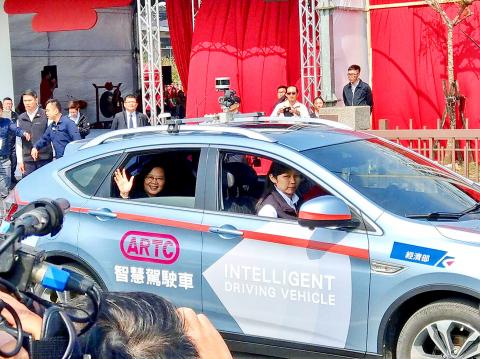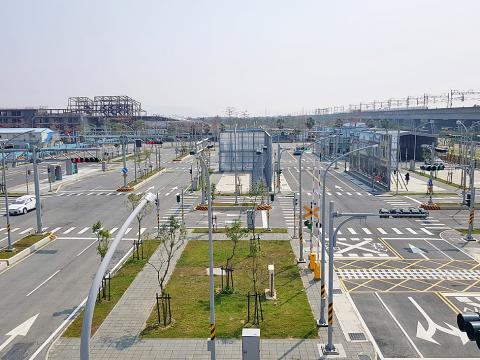President Tsai Ing-wen (蔡英文) yesterday opened the nation’s first closed testing ground for self-driving cars, the Taiwan CAR (connected, autonomous and road-test) Lab in Tainan.
“Autonomous car technology is an opportunity that Taiwanese industries cannot miss,” and it is expected to help bring local vehicle component manufacturing and the entire technological industry to new heights, she said.
Following the enactment of the Act for Uncrewed Vehicle Technology Innovations and Experiments (無人載具科技創新實驗條例) last year, other traffic regulations, and financial and insurance systems are being planned, Tsai said.

Photo: Chien Hui-ju, Taipei Times
Tsai and former premier William Lai (賴清德) — a former Tainan mayor — toured the lab site in a car made by the Automotive Research and Testing Center, one of three at the facility, with the vehicle easily moving around a car-shaped barrier.
The Taiwan CAR Lab covers 1.75 hectares in the Salun Smart Green Energy Science City compound and features 13 simulated traffic scenarios, the National Applied Research Laboratories (NARL) said.
The other vehicles at the lab were made by Acer Inc (宏碁) and National Cheng Kung University faculty, and they can achieve level 4 automation — high automation without human presence in specific conditions, NARL Planning and Promotion Office associate researcher Chang Lung-yao (張龍耀) said.

Photo: Chien Hui-ju, Taipei Times
However, crew members are required to be on standby inside the vehicles at this stage, Chang said.
Building the Taiwan CAR Lab cost about NT$250 million (US$8.12 million at the current exchange rate) and took nine months, he said, adding that test dummies, fake motor scooters and a rain simulation would be added later.
Automated cars have to undergo testing within a closed area before they can be tested on open roads, and step-by-step progress is more suitable to Taiwan given its limited market scope, Minister of Science and Technology Chen Liang-gee (陳良基) said.
The ministry is collaborating with the European Chamber of Commerce Taiwan to ensure that the safety standards for local autonomous cars match global criteria, Chen said.
Driverless navigation is a cross-disciplinary industry that is open to students in all university departments, especially as some researchers are studying passenger behavior in such vehicles, he added.
The Office of Science and Technology is consulting with the six special municipalities about using larger autonomous buses for public transport in designated areas, which might happen next year, office Executive Secretary Tsai Zse-hong (蔡志宏) said.
A group of Cheng Kung students attended yesterday’s opening ceremony to see a model car they helped developed with Juang Jyh-ching (莊智清), a professor of electrical engineering, and other faculty members.
Integrating data collected from the vehicle’s sensing, positioning and controlling systems was the most challenging part of developing it, and their team would continue to work on improving related technology for future road testing in populated areas, the students said.

MAKING WAVES: China’s maritime militia could become a nontraditional threat in war, clogging up shipping lanes to prevent US or Japanese intervention, a report said About 1,900 Chinese ships flying flags of convenience and fishing vessels that participated in China’s military exercises around Taiwan last month and in January last year have been listed for monitoring, Coast Guard Administration (CGA) Deputy Director-General Hsieh Ching-chin (謝慶欽) said yesterday. Following amendments to the Commercial Port Act (商港法) and the Law of Ships (船舶法) last month, the CGA can designate possible berthing areas or deny ports of call for vessels suspected of loitering around areas where undersea cables can be accessed, Oceans Affairs Council Minister Kuan Bi-ling (管碧玲) said. The list of suspected ships, originally 300, had risen to about

DAREDEVIL: Honnold said it had always been a dream of his to climb Taipei 101, while a Netflix producer said the skyscraper was ‘a real icon of this country’ US climber Alex Honnold yesterday took on Taiwan’s tallest building, becoming the first person to scale Taipei 101 without a rope, harness or safety net. Hundreds of spectators gathered at the base of the 101-story skyscraper to watch Honnold, 40, embark on his daredevil feat, which was also broadcast live on Netflix. Dressed in a red T-shirt and yellow custom-made climbing shoes, Honnold swiftly moved up the southeast face of the glass and steel building. At one point, he stepped onto a platform midway up to wave down at fans and onlookers who were taking photos. People watching from inside

Japan’s strategic alliance with the US would collapse if Tokyo were to turn away from a conflict in Taiwan, Japanese Prime Minister Sanae Takaichi said yesterday, but distanced herself from previous comments that suggested a possible military response in such an event. Takaichi expressed her latest views on a nationally broadcast TV program late on Monday, where an opposition party leader criticized her for igniting tensions with China with the earlier remarks. Ties between Japan and China have sunk to the worst level in years after Takaichi said in November that a hypothetical Chinese attack on Taiwan could bring about a Japanese

STREAMLINED: The dedicated funding would allow the US to transfer equipment to Taiwan when needed and order upgraded replacements for stockpiles, a source said The US House of Representatives on Thursday passed a defense appropriations bill totaling US$838.7 billion, of which US$1 billion is to be allocated to reinforcing security cooperation with Taiwan and US$150 million to replace defense articles provided to the nation. These are part of the Consolidated Appropriation Act, which the US House yesterday passed with 341 votes in favor and 88 against. The act must be passed by the US Senate before Friday next week to avoid another government shutdown. The US House Committee on Appropriations on Monday unveiled the act, saying that it allocates US$1 billion for the Taiwan Security Cooperation Initiative